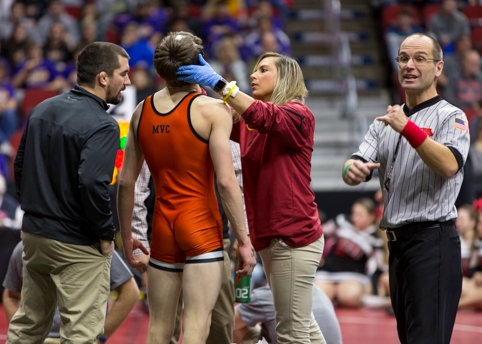
Article reposted from Iowa State University College of Human Sciences
Author: Kent Davis
As student-athletes take on their opponents at this year’s state high school wrestling tournament, they’ll have the support of Iowa State University athletic training majors — a relationship that this weekend marks its 45th year.
“We have been fortunate to have such a positive working relationship with the Iowa High School Athletic Association for so many years and to meet athletes, coaches, officials, and other athletic trainers from across the state of Iowa,” said Mary Meier, who directs Iowa State’s athletic training program. “Iowa State University athletic training students and staff get valuable experiences and opportunities while providing excellent medical coverage for the state high school wrestling tournament. It is an athletic event we all look forward to covering every year and are proud to be a part of it.”
Alan Beste, executive director of the Iowa High School Athletic Association, has witnessed Iowa State personnel — both certified athletic trainers and students — mat side as they assess injuries and counsel athletes, their parents, and guardians.
“The involvement of Iowa State University in the state wrestling tournament for the past 45 years has allowed the Athletic Association to provide quality sports medicine care for the students participating,” he said. “Our partnership has a 45-year history that we hope extends well into the future for the benefit of the wrestlers participating.”
Stephen Reed, who leads Iowa State’s group of undergraduate students as a certified athletic trainer at this year’s tournament, said that it’s rewarding to contribute to the success of athletes from across the state of Iowa.
“I love helping athletes return to play after an injury,” he said. “Seeing that I helped them get back, whether it’s a minor ankle sprain, or helping them rehab from knee surgery — to see them get out there and succeed at what they were doing before the injury at the same level or even at a higher level than before is a rewarding experience.”
The certified athletic trainers must be as quick on their feet as the athletes they assist. When a wrestler sustains an injury, an athletic trainer has 90 seconds to evaluate and treat the athlete. If blood is involved, an athletic trainer has five minutes before a wrestler must return to the mat.
“Athletic trainers need to work quickly due to there being a limited amount of time to stop the bleeding or assess an injury,” said Emily Rocha, a senior in athletic training who is helping at the wrestling tournament. “I have been building these skills by working with the Ames High School wrestling team all winter, which includes working their practices and home meets.”
Undergraduate students are paired with certified athletic trainers at the tournament, giving them a high-stakes, real-world opportunity to hone their observation skills and learn from certified athletic trainers.
“As certified athletic trainers, we want to make sure that the profession is strong,” Reed said. “We want to make sure that our students are gaining as much exposure and getting as much education as they possibly can.”
At times, an athletic trainer must tell wrestlers that their injuries are too serious for them to return to the mat. Reed said it’s important for future athletic trainers to observe that interplay between athlete and athletic trainer.
“Students gain experience in witnessing the mindset that coaches and athletes display at state tournaments,” Reed said. “The last thing a coach, or especially an athlete, wants is for us to tell them that an athlete can’t complete because of an injury. Seeing how that is handled is extremely important.”
Alumna Kari Sandquist, the head athletic trainer for Ames High School through McFarland Clinic’s sports medicine department, credits Iowa State’s program with sharpening her skills.
“Iowa State’s involvement at the tournament is a one-of-a-kind experience that most undergraduate programs do not provide for their students,” said Sandquist, who graduated with her bachelor’s degree in kinesiology and health in 2012 and completed her master’s degree in education in 2016. “It built my skills in being a people person, evaluating athletes, and handling emergency situations.”
Reed said that experiences like Sandquist’s have contributed to the strong reputation of Iowa State’s program.
“It’s good exposure for our athletic training program,” Reed said. “Everyone in the state of Iowa can see that Iowa State is teaching these young athletic trainers and producing quality athletic trainers — and that anyone who graduates from our program can be trusted. It shows that we produce quality people in the profession.”
RELATED STORIES:
Getting athletes back to the game
ISU athletic trainers put skills to the test at state wrestling tournament
Athletic training becomes stand-alone major
KEY CONTACTS:
Stephen Reed, graduate student in interdisciplinary studies, graduate assistant in kinesiology, Iowa State University, sreed@iastate.edu
Kari Sandquist, 2012 graduate in athletic training; head athletic trainer, Ames High School, karisandquist@gmail.com
Emily Rocha, senior in athletic training, Iowa State University, edrocha@iastate.edu
Mary Meier, ISU athletic training program director, 515-294-3587, mary@iastate.edu
Alan Beste, executive director, Iowa High School Athletic Association, abeste@iahsaa.org
Kent Davis, communications specialist, College of Human Sciences, Iowa State University, 515-294-1326, davisk@iastate.edu